Film set design
based on a novel
"One Hundred Years of Solitude"
by Gabriel Garcia Marquez
Project includes set design sketches of Buendia family house

"At that time Macondo was a village of twenty adobe houses, built on the bank of a river of clear water that ran along a bed of polished stones, which were white and enormous, like prehistoric eggs. The world was so recent that many things lacked names, and in order to indicate them it was necessary to point."
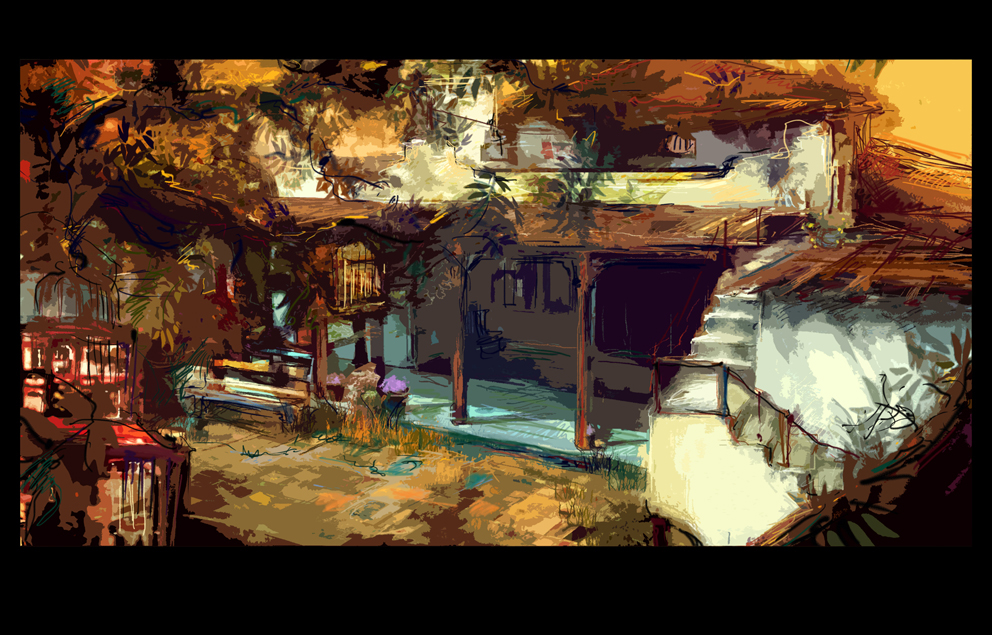
"Since the time of its founding, José Arcadio Buendía had built traps and cages. In a short time he filled not only his own house but all of those in the village with troupials, canaries, bee eaters, and redbreasts. The concert of so many different birds became so disturbing that Úrsula would plug her ears with beeswax so as not to lose her sense of reality."

"José Arcadio Buendía spent the long months of the rainy season shut up in a small room that he had built in the rear of the house so that no one would disturb his experiments. Having completely abandoned his domestic obligations, he spent entire nights in the courtyard watching the course of the stars and he almost contracted sunstroke from trying to establish an exact method to ascertain noon."

"In the small separate room, where the walls were gradually being covered by strange maps and fabulous drawings, he taught them to read and write and do sums, and he spoke to them about the wonders of the world, not only where his learning had extended, but forcing the limits of his imagination to extremes... Those hallucinating sessions remained printed on the memories of the boys in such a way that many years later, a second before the regular army officer gave the firing squad the command to fire, Colonel Aureliano Buendía saw once more that warm March afternoon on which his father had interrupted the lesson in physics and stood fascinated, with his hand in the air and his eyes motionless, listening to the distant pipes, drums, and jingles of the gypsies, who were coming to the village once more, announcing the latest and most startling discovery of the sages of Memphis."

"While his father was putting the town in order and his mother was increasing their wealth with her marvelous business of candied little roosters and fish, which left the house twice a day strung along sticks of balsa wood, Aureliano spent interminable hours in the abandoned laboratory, learning the art of silverwork by his own experimentation."


"It was the insomnia plague… The Indian woman explained that the most fearsome part of the sickness of insomnia was not the impossibility of sleeping, for the body did not feel any fatigue at all, but its inexorable evolution toward a more critical manifestation: a loss of memory."

"Úrsula, who had learned from her mother the medicinal value of plants, prepared and made them all drink a brew of monkshood, but they could not get to sleep and spent the whole day dreaming on their feet. In that state of hallucinated lucidity, not only did they see the images of their own dreams, but some saw the images dreamed by others. It was as if
the house were full of visitors."

"So busy was she in her prosperous enterprises that one afternoon she looked distractedly toward the courtyard while the Indian woman helped her sweeten the dough and she saw two unknown and beautiful adolescent girls doing frame embroidery in the light of the sunset. They were Rebeca and Amaranta... Then she took out the money she had accumulated over long years of hard labor, made some arrangements with her customers, and undertook the enlargement of the house."

"The new house, white, like a dove, was inaugurated with a dance. Úrsula had got that idea from the afternoon when she saw Rebeca and Amaranta changed into adolescents, and it could almost have been said that the main reason behind the construction was a desire to have a proper place for the girls to receive visitors. In order that nothing would be lacking in splendor she worked like a galley slave as the repairs were under way, so that before they were finished she had ordered costly necessities for the decorations, the table service, and the marvelous invention that was to arouse the astonishment of the town and the jubilation of the young people: the pianola."

"Emancipated for the moment at least from the torment of fantasy, José Arcadio Buendía in a short time set up a system of order and work which allowed for only one bit of license: the freeing of the birds, which, since the time of the founding, had made time merry with their flutes, and installing in their place musical clocks in every house. They were wondrous clocks made of carved wood, which the Arabs had traded for macaws and which José Arcadio Buendía had synchronized with such precision that every half hour the town grew merry with the progressive chords of the same song until it reached the climax of a noontime that was as exact and unanimous as a complete waltz."

"A long time passed before Rebeca became incorporated into the life of the family. She would sit in her small rocker sucking her finger in the most remote corner of the house. Nothing attracted her attention except the music of the clocks, which she would look for every half hour with her frightened eyes as if she hoped to find it someplace in the air."

"Úrsula barely had the strength to take care of the two sick girls... Weeping with rage, she cursed the day that it had occurred to her to buy the pianola, and she forbade the embroidery lessons and decreed a kind of mourning with no one dead which was to be prolonged until the daughters got over their hopes."

"She was listening to it because it was the music with which Pietro Crespi had taught them how to dance. Aureliano listened to it simply because everything, even music, reminded him of Remedios. The house became full of loves Aureliano expressed it in poetry that had no beginning or end. He would write it on the harsh pieces of parchment that Melquíades gave him, on the bathroom walls, on the skin of his arms, and in all of it Remedios would appear transfigured..."

"At dusk, when Pietro Crespi would arrive, preceded by a cool breath of lavender and always bringing a toy as a gift, his fiancée would receive the visitor in the main parlor with doors and windows open to be safe from any suspicion... Those visits were filling the house with remarkable toys. Mechanical ballerinas, music boxes, acrobatic monkeys, trotting horses, clowns who played the tambourine: the rich and startling mechanical fauna that Pietro Crespi brought dissipated José Arcadio Buendía's affliction over the death of Melquíades and carried him back to his old days as an alchemist."

"When Úrsula undertook the enlargement of the house, she had them build him a special room next to Aureliano's workshop, far from the noise and bustle of the house, with a window flooded with light and a bookcase where she herself put in order the books that were almost destroyed by dust and moths, the flaky stacks of paper covered with indecipherable signs, and the glass with his false teeth, where some aquatic plants with tiny yellow flowers had taken root. The new place seemed to please Melquíades, because he was never seen any more, not even in the dining room."

"In the meantime, Melquíades had printed on his plates everything that was printable in Macondo, and he left the daguerreotype laboratory to the fantasies of José Arcadio Buendía who had resolved to use it to obtain scientific proof of the existence of God. Through a complicated process of superimposed exposures taken in different parts of the house, he was sure that sooner or later he would get a daguerreotype of God, if He existed, or put an end once and for all to the supposition of His existence."

"José Arcadio Buendía finally got what he was looking for: he connected the mechanism of the clock to a mechanical ballerina, and the toy danced uninterruptedly to the rhythm of her own music for three days. That discovery excited him much more than any of his other harebrained undertakings. He stopped eating. He stopped sleeping. Only the vigilance and care of Rebeca kept him from being dragged off by his imagination into a state of perpetual delirium from which he would not recover."

"Aureliano Buendia and Remedios Moscote were married one Sunday in March before the altar Father Nicanor Reyna had set up in the parlor."

"Tied to the trunk of the chestnut tree, huddled on a wooden stool underneath the palm shelter, the enormous old man, discolored by the sun and rain, made a vague smile of gratitude and at the piece of cake with his fingers, mumbling an unintelligible psalm."

"Úrsula ordered a mourning period of closed doors and windows, with no one entering or leaving except on matters of utmost necessity. She prohibited any talking aloud for a year and she put Remedios' daguerreotype in the place where her body had been laid out, with a black ribbon around it and an oil lamp that was always kept lighted. Future generations, who never let the lamp go out, would be puzzled at that girl in a pleated skirt, white boots, and with an organdy band around her head, and they were never able to connect her with the standard image of a great-grandmother."

" “These are not times to go around thinking about weddings.” That opinion, which Úrsula understood only some months later, was the only sincere one that Aureliano could express at that moment, not only with respect to marriage, but to anything that was not war."

"Úrsula fought to preserve common sense in that extravagant house, having broadened her business of little candy animals with an oven that went all night turning out baskets and more baskets of bread and a prodigious variety of puddings, meringues, and cookies, which disappeared in a few hours on the roads winding through the swamp."
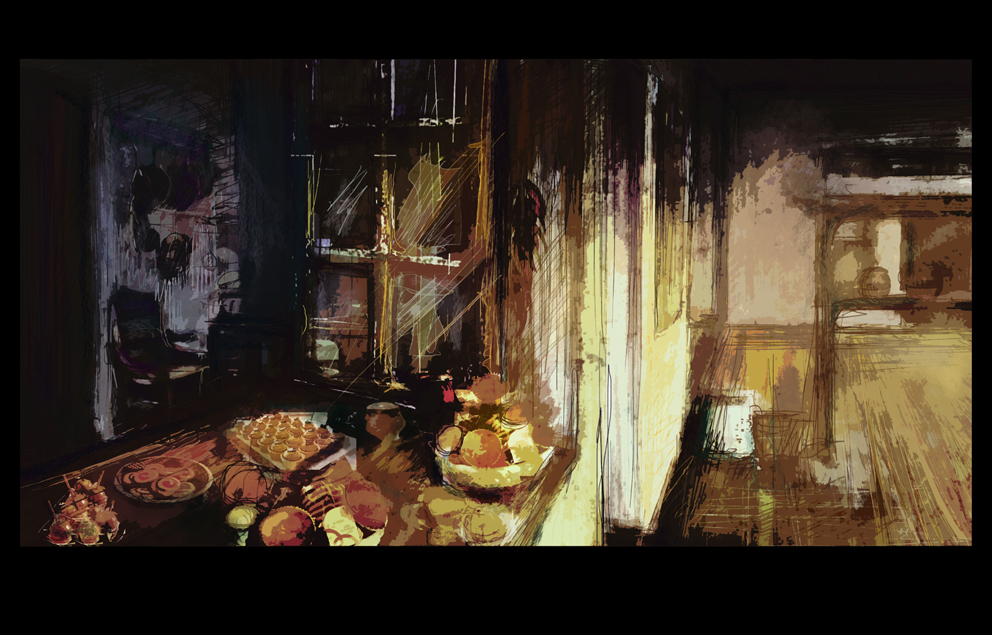

"The house was full of children. Úrsula had taken in Santa Sofía de la Piedad with her older daughter and a pair of twins, who had been born five months after Arcadio had been shot... Amaranta took care of them all. She put small wooden chairs in the living room and established a nursery with other children from neighboring families."


"...Those were times when no one was aware of anything unless it was shouted on the porch, because with the bustle of the bakery, the surprises of the war, the care of the children, there was not much room for thinking about other peoples happiness."
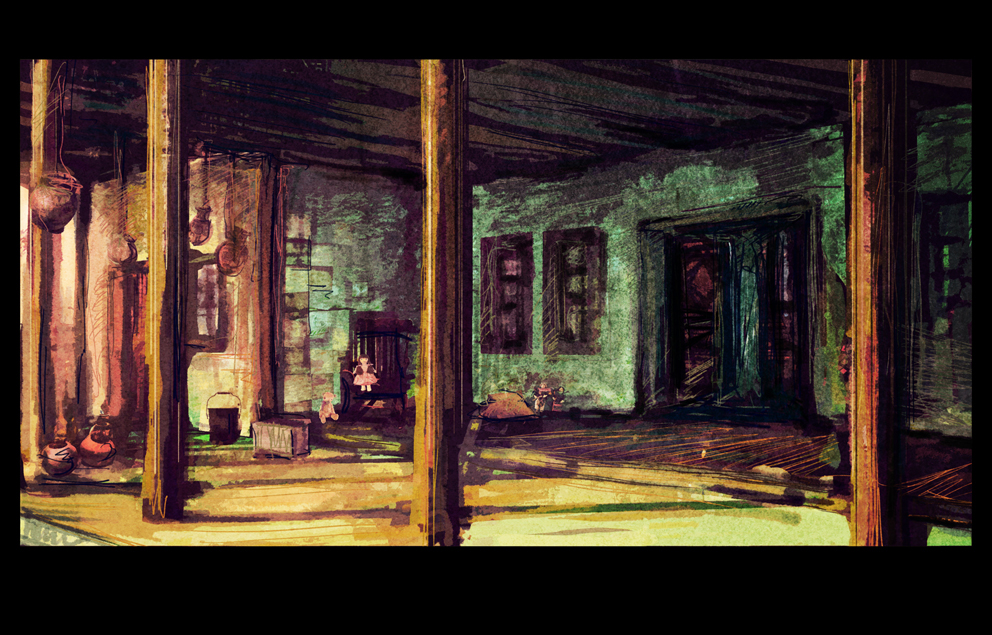
"When he was alone, José Arcadio Buendía consoled himself with the dream of the infinite rooms. He dreamed that he was getting out of bed, opening the door and going into an identical room with the same bed with a wrought-iron head, the same wicker chair, and the same small picture of the Virgin of Help on the back wall...Then he would go back from room to room, walking in reverse, going back over his trail, and he would find Prudencio Aguilar in the room of reality. But one night, two weeks after they took him to his bed, Prudencio Aguilar touched his shoulder in an intermediate room and he stayed there forever, thinking that it was the real room... A short time later, when the carpenter was taking measurements for the coffin, through the window they saw a light rain of tiny yellow flowers falling. So many flowers fell from the sky that in the morning the streets were carpeted with a compact cushion and they had to clear them away with shovels and rakes so that the funeral procession could pass by."

"Tall, broad-shouldered, proud, always dressed in abundant petticoats with the lace and in air of distinction that resisted the years and bad memories, Amaranta seemed to carry the cross of ashes of virginity on her forehead. In reality she carried it on her hand in the black bandage, which she did not take off even to sleep and which she washed and ironed herself. Her life was spent in weaving her shroud. It might have been said that she wove during the day and unwove during the night, and not with any hope of defeating solitude in that way, but, quite the contrary, in order to nurture it."

"Amaranta,however, whose hardness of heart frightened her, whose concentrated bitterness made her bitter, suddenly became clear to her in the final analysis as the most tender woman who had ever existed, and she understood with pitying clarity that the unjust tortures to which she had submitted Pietro Crespi had not been dictated by a desire for vengeance, as everyone had thought, nor had the slow martyrdom with which she had frustrated the life of Colonel Gerineldo Márquez been determined by the gall of her bitterness, as everyone had thought, but that both actions had been a mortal struggle between a measureless love and an invincible cowardice, and that the irrational fear that Amaranta had always had of her own tormented heart had triumphed in the end."

"On the shelves were the books bound in a cardboard-like material, pale, like tanned human skin, and the manuscripts were intact. In spite of the room's having been shut up for many years, the air seemed fresher than in the rest of the house. Everything was so recent that several weeks later, when Úrsula went into the room with a pail of water and a brush to wash the floor, there was nothing for her to do. Aureliano Segundo was deep in the reading of a book... "

"When Úrsula realized that José Arcadio Segundo was a cockfight man and that Aureliano Segundo played the accordion at his concubine's noisy parties, she thought she would go mad with the combination. It was as if the defects of the family and none of the virtues had been concentrated in both. Then she decided that no one again would be called Aureliano or José Arcadio. Yet when Aureliano Segundo had his first son she did not dare go against his will."

"The war, relegated to the attic of bad memories, was momentarily recalled with the popping of champagne bottles. Since Aureliano Segundo had taken charge of the house those festivities were a common thing, even when there was no motive as proper as the birth of a Pope. In a few years, without effort, simply by luck, he had accumulated one of the largest fortunes in the swamp thanks to the supernatural proliferation of his animals. “Save something now,” Úrsula would tell her wild great-grandson. “This luck is not going to last all your life.” But Aureliano Segundo paid no attention to her. The more he opened champagne to soak his friends, the more wildly his animals gave birth and the more he was convinced that his lucky star was not a matter of his conduct but an influence of Petra Cotes, his concubine, whose love had the virtue of exasperating nature."

"Úrsula wondered what entanglements he had got into, whether he might be stealing, whether he had become a rustler, and every time she saw him uncorking champagne just for the pleasure of pouring the foam over his head, she would shout at him and scold him for the waste. It annoyed him so much that one day when he awoke in a merry mood, Aureliano Segundo appeared with a chest full of money, a can of paste, and a brush, and singing at the top of his lungs the old songs of Francisco the Man, he papered the house inside and out and from top to bottom, with one-peso banknotes. The old mansion, painted white since the time they had brought the pianola, took on the strange look of a mosque."

" Aureliano Segundo understood from the night of his wedding that he would return to the house of Petra Cotes much sooner than when he would have to put on the patent leather boots: Fernanda was a woman who was lost in the world. She had been born and raised in a city six hundred miles away, a gloomy city where on ghostly nights the coaches of the viceroys still rattled through the cobbled streets... In the manor house, which was paved with tomblike slabs, the sun was never seen."

"During that interminable night while Colonel Gerineldo Márquez thought about his dead afternoons in Amaranta's sewing room, Colonel Aureliano Buendía scratched for many hours trying to break the hard shell of his solitude. His only happy moments, since that remote afternoon when his father had taken him to see ice, had taken place in his silver workshop where he passed the time putting little gold fishes together. He had had to start thirty-two wars and had had to violate all of his pacts with death and wallow like a hog in the dungheap of glory in order to discover the privileges of simplicity almost forty years late."
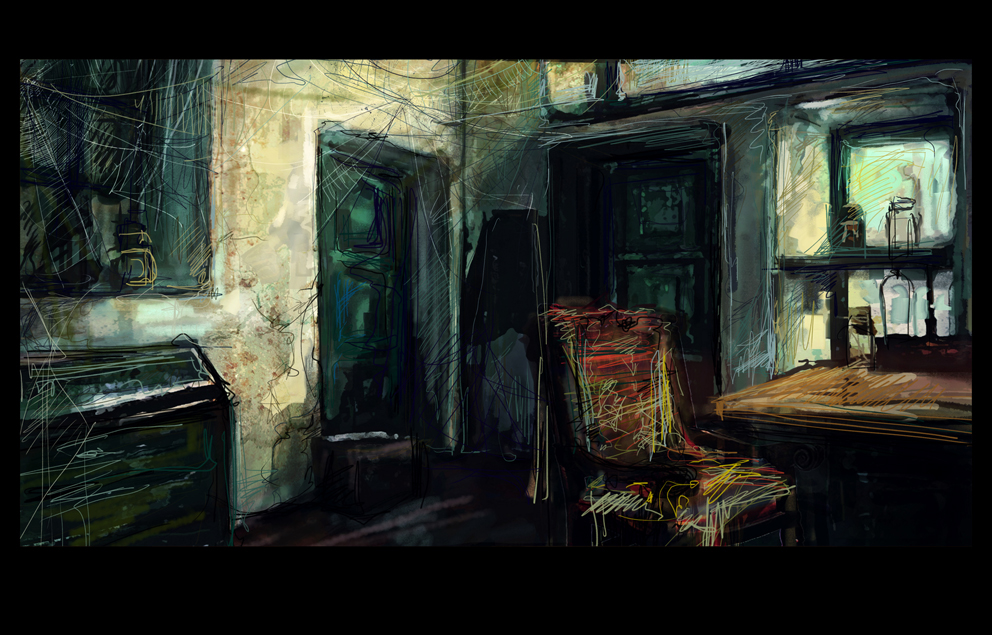
"With a vitality that seemed impossible at her age, Úrsula had rejuvenated the house again. “Now they're going to see who I am,” she said when she saw that her son was going to live. “There won't be a better, more open house in all the world than this madhouse.” She had it washed and painted, changed the furniture, restored the garden and planted new flowers, and opened doors and windows so that the dazzling light of summer would penetrate even into the bedrooms. She decreed an end to the numerous superimposed periods of mourning and she herself exchanged her rigorous old gowns for youthful clothing. The music of the pianola again made the house merry."

"Taciturn, silent, insensible to the new breath of vitality that was shaking the house, Colonel Aureliano Buendía could understand only that the secret of a good old age is simply an honorable pact with solitude."

"The bodies of the Aurelianos were no sooner cold in their graves than Aureliano Segundo had the house lighted up again, filled with drunkards playing the accordion and dousing themselves in champagne, as if dogs and not Christians had died, and as if that madhouse which had cost her so many headaches and so many candy animals was destined to become a trash heap of perdition."

"As long as Úrsula had full use of her faculties some of the old customs survived and the life of the family kept some quality of her impulsiveness, but when she lost her sight and the weight of her years relegated her to a corner, the circle of rigidity begun by Fernanda from the moment she arrived finally closed completely and no one but she determined the destiny of the family. The business in pastries and small candy animals that Santa Sofía de la Piedad had kept up because of Úrsula's wishes was considered an unworthy activity by Fernanda and she lost no time in putting a stop to it. The doors of the house, wide open from dawn until bedtime, were closed during siesta time under the pretext that the sun heated up the bedrooms and in the end they were closed for good."

"Little by little the funereal splendor of the ancient and icy mansion was being transformed into the splendor of the House of Buendía. “They've already sent us the whole family cemetery,” Aureliano Segundo commented one day. “All we need now are the weeping willows and the tombstones.” "

"But unlike Amaranta, unlike all of them, Meme still did not reveal the solitary fate of the family and she seemed entirely in conformity with the world, even when she would shut herself up in the parlor at two in the afternoon to practice the clavichord with an inflexible discipline... The first sign of that calamitous inheritance was revealed on her third vacation, when Meme appeared at the house with four nuns and sixty-eight classmates whom she had invited to spend a week with her family on her own Initiative and without any previous warning... When they finally left, the flowers were destroyed, the furniture broken, and the walls covered with drawings and writing, but Fernanda pardoned them for all of the damage because of her relief at their leaving. She returned the borrowed beds and stools and kept the seventy-two chamberpots in Melquíades'room. The locked room, about which the spiritual life of the house revolved in former times, was known from that time on as the “chamberpot room.” "

"In the house they still had guests for lunch and the old routine was never really set up again until the banana company left years later. Nevertheless, there were radical changes in the traditional sense of hospitality because at that time it was Fernanda who imposed her rules. With Úrsula relegated to the shadows and with Amaranta absorbed In the work of her winding cloth, the former apprentice queen had the freedom to choose the guests and impose on them the rigid norms that her parents had taught her."

"Meme was entering a fruitful age. She was not beautiful, as Amaranta had never been, but on the other hand she was pleasant, uncomplicated, and she had the virtue of making a good impression on people from the first moment. She had a modem spirit that wounded the antiquated sobriety and poorly disguised miserly heart of Fernanda, and that, on the other hand, Aureliano Segundo took pleasure in developing. It was he who resolved to take her out of the bedroom she had occupied since childhood, where the fearful eyes of the saints still fed her adolescent terrors, and he furnished for her a room with a royal bed, a large dressing table, and velvet curtains, not realizing that he was producing a second version of Petra Cotes's room."

"From the moment she saw him Meme let herself be deceived by herself and believed that what was really going on was that she could not bear the desire to be alone with Mauricio Babilonia, and she was made indignant by the certainty that he understood that when he saw her arrive... It was then that she realized that the yellow butterflies preceded the appearances of Mauricio Babilonia... But when Mauricio Babilonia began to pursue her like a ghost that only she could identify in the crowd, she understood that the butterflies had something to do with him."

"It rained for four years, eleven months, and two days. There were periods of drizzle during which everyone put on his full dress and a convalescent look to celebrate the clearing, but the people soon grew accustomed to interpret the pauses as a sign of redou-bled rain... Just as during the insomnia plague, as Úrsula came to remember during those days, the calamity itself inspired defenses against boredom."
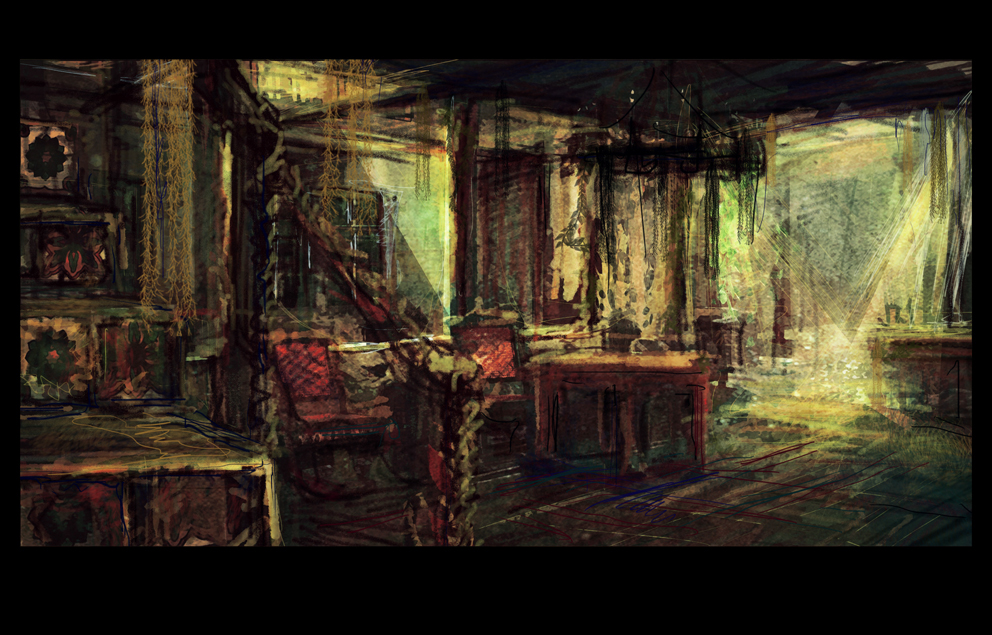
"The worst part was that the rain was affecting everything and the driest of machines would have flowers popping out among their gears if they were not oiled every three days, and the threads in brocades rusted, and wet clothing would break out in a rash of saffron-colored moss. The air was so damp that fish could have come in through the doors and swum out the windows, floating through the atmosphere in the rooms."

"Amaranta Úrsula and little Aureliano would remember the rains as a happy time. In spite of Fernanda' s strictness, they would splash in the puddles in the courtyard, catch lizards and dissect them, and pretend that they were poisoning the soup with dust from butterfly wings when Santa Sofía de la Piedad was not looking Úrsula was their most amusing plaything."

"When the table was still raised up on bricks and the chairs put on planks so that those at the table would not get their feet wet, she still served with linen tablecloths and fine chinaware and with lighted candles, because she felt that the calamities should not be used as a pretext for any relaxation in customs. No one went out into the street any more. If it had depended on Fernanda, they would never have done so, not only since it started raining but since long before..."

"She was too old then and living on borrowed time to repeat the miracle of the little candy animals, and none of her descendants had inherited her strength. The house stayed closed on Fernanda's orders... With Úrsula's death the house again fell into a neglect from which it could not be rescued even by a will as resolute and vigorous as that of Amaranta Úrsula, who many years later, being a happy, modern woman without prejudices, with her feet on the ground, opened doors and windows in order to drive away the rain, restored the garden, exterminated the red ants who were already walking across the porch in broad daylight, and tried in vain to reawaken the forgotten spirit of hospitality. "

"On Friday at two in the afternoon the world lighted up with a crazy crimson sun as harsh as brick dust and almost as cool as water, and it did not rain again for ten years. Macondo was in ruins."

"Aureliano did not leave Melquíades' room for a long time. He learned by heart the fantastic legends of the crumbling books, the synthesis of the studies of Hermann the Cripple, the notes on the science of demonology, the keys to the philosopher's stone, the Centuries of Nostradamus and his research concerning the plague, so that he reached adolescence without knowing a thing about his own time but with the basic knowledge of a medieval man."

"Amaranta Úrsula returned with the angels of December, driven on a sailor's breeze, leading her husband by a silk rope tied around his neck... She took charge of a crew of carpenters, locksmiths, and masons, who filled in the cracks in the floor, put doors and windows back on their hinges, repaired the furniture, and white-washed the walls inside and out, so that three months after her arrival one breathed once more the atmosphere of youth and festivity that had existed during the days of the pianola. No one in the house had ever been in a better mood at all hours and under any circumstances, nor had anyone ever been readier to sing and dance and toss all items and customs from the past into the trash."
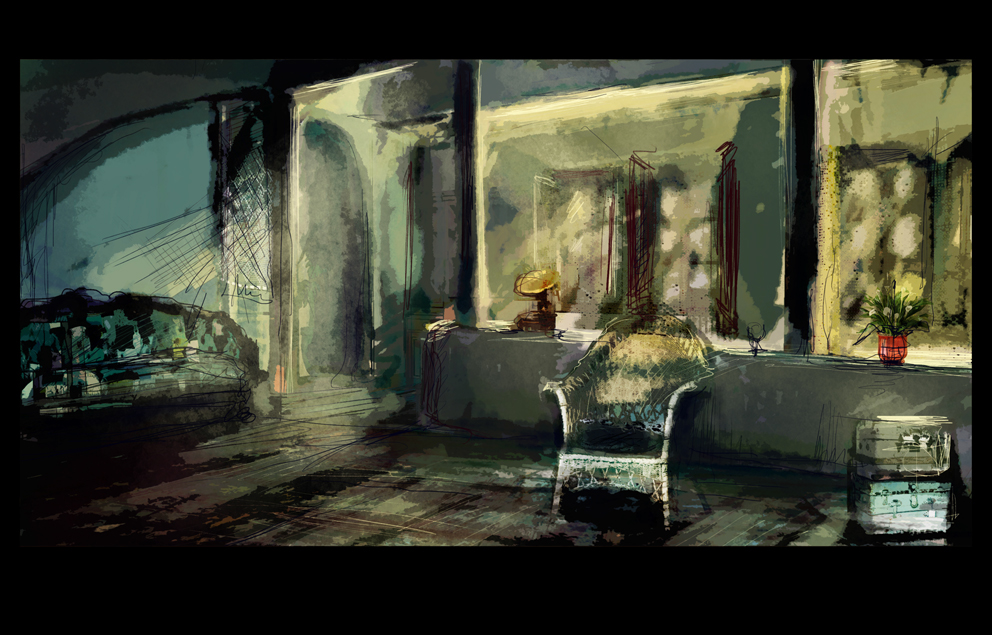
"The rest of the house was given over to the tenacious assault of destruction. The silver shop, Melquíades' room, the primitive and silent realm of Santa Sofía de la Piedad remained in the depths of a domestic jungle that no one would have had the courage to penetrate."

"Aureliano, had never been more lucid in any act of his life as when he forgot about his dead ones and the pain of his dead ones and nailed up the doors and windows again with Fernanda's crossed boards so as not to be disturbed by any temptations of the world, for he knew then that his fate was written in Melquíades' parchments."
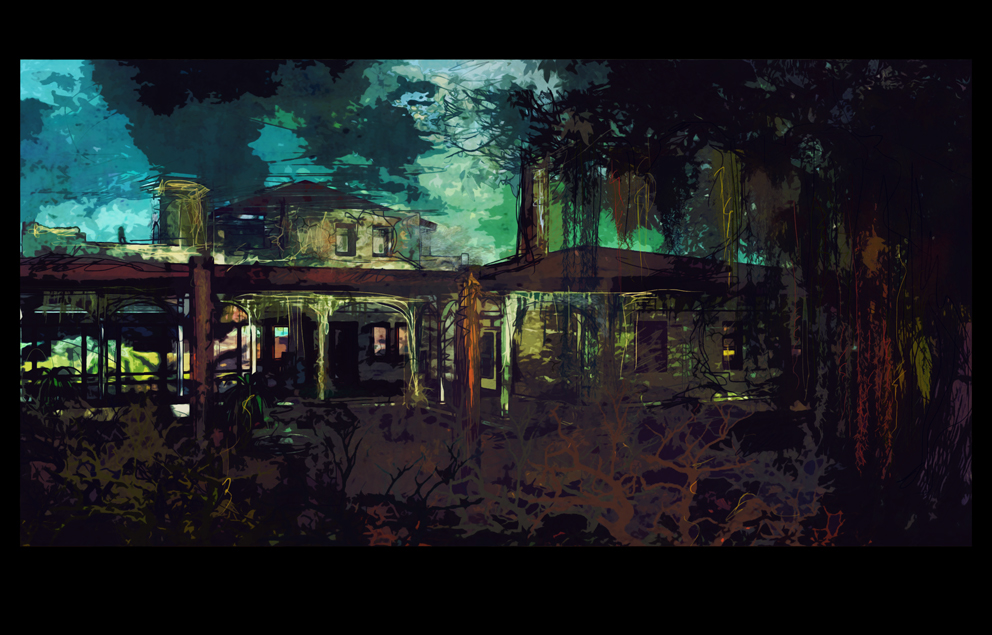
"...Races condemned to one hundred years of solitude did not have a second opportunity on earth."

